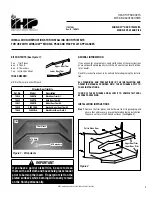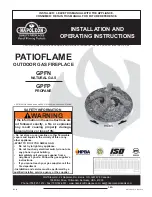
12
|
Regency Ultimate™ U900E-11 Gas Fireplace
owner's information
Smart Thermostat (Transmitter Operation)
The Smart Thermostat function adjusts the flame height in accordance
to the difference between the set point temperature and the actual
room temperatures. As the room temperature gets closer to the set
point the Smart Function will modulate the flame down.
To activate this function, press the Thermostat Key (Fig. 1) until the
word "SMART" appears to the right of the temperature bulb graphic
(Fig. 11).
To adjust the set temperature, press the Up or Down Arrow Keys until
the desired set temperature is displayed on the LCD screen of the
Transmitter (Fig. 12).
Note. When Smart Thermostat is activated, manual flame height
adjustment is disabled.
Figure 12
Figure 11: Smart Flame Function
Fan Speed Control**
If the appliance is equipped with a hot air circulating fan, the speed of
the fan can be controlled by the Proflame system. The fan speed can
be adjusted through six (6) speeds. To activate this function use the
Mode Key (fig.1) to index to the fan control icon (Fig. 13). Use the Up/
Down Arrow Keys (fig.1) to turn on, off or adjust the fan speed (fig. 14).
A single “beep” will confirm reception of the command.
Figure 13
Figure 14
Remote dimmer control (Light)**
The auxiliary function controls the AUX power outlet by the dimmable
light control. To activate this function use the Mode Key (fig. 1) to index
to the AUX icon (fig. 15 & 16).
The intensity of the output can be adjusted through six (6) levels. Use
the Up/Down Arrow Keys (Fig.1) adjust the output level (Fig. 16). A
single “beep” will confirm reception of the command.
Note
: This function is available only with the IFC Control Module.
Figure 15
Figure 16
Split Flow control**
The secondary burner is controlled by the split Flow. To activate this
function use the Mode Key (fig. 1) to index to the SPLIT FLOW mode
icon (fig. 17 & 18).
Pressing the Up Arrow Key will activate the secondary burner. Pressing
the Down Arrow Key will turn the secondary burner off. A single “beep”
will confirm the reception of the command.
Figure 17
Figure 18













































